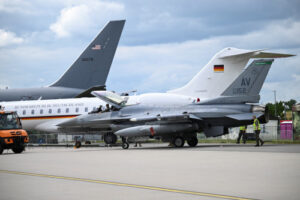By Allison Lampert
(Reuters) -The largest U.S. aerospace trade group opened the door on Friday to discussions on specific tariffs, after President-elect Donald Trump suggested slapping duties on countries including Mexico and Canada.
Aerospace Industries Association, which represents U.S. planemaking and defense companies such as Boeing and General Dynamics, addressed the prospect of tariffs for the first time, saying in a statement it would discuss how to tailor them to protect national security and key industries.
The statement did not give specifics.
“We are eager to work with the Trump administration to discuss where tariff policy may support our products, while also ensuring the industry is empowered to continue growing in a way that supports U.S. national security needs and maintains our position as a leading high-technology, U.S.-centered manufacturing sector,” the statement said.
Trump’s warning in November about potential 25% tariffs on imports from Mexico and Canada has triggered threats of retaliation from Ottawa and raised concerns among the automotive and other sectors that the move could also hit U.S. industry.
In 2023, Canada was the top import country and third-largest export destination for aerospace and defense trade with the United States, according to AIA. Mexico was not among the top five.
Earlier this week, the CEO of AerCap, the world’s largest aircraft-leasing company, warned the tariffs could hit already fragile aerospace supply chains and hinder Boeing’s efforts to restore much-needed cash. Boeing declined comment on the prospect of tariffs.
Some defense and commercial aerospace executives had been banking on their supply chains receiving waivers for imported components if tariffs are imposed, sources told Reuters, although it is not clear how the Trump administration would act.
In June 2021, the United States and European Union agreed on a five-year truce over a nearly 17-year conflict on aircraft subsidies that had led to billions of dollars in transatlantic tariffs on European and U.S. industries.
A separate side agreement of more than 30 countries limits trade sanctions on aircraft parts. However, the U.S. levies duties on some materials such as titanium sponge that are key to building planes.
AIA stressed the importance of trade fueling “economic growth and innovation in American aerospace and defense,” adding that “over a 40-year period, the industry experienced over 2,000 percent growth in exports.”
In November, Trump said on social media that immediately after his Jan. 20 inauguration, he would sign “all necessary documents” to begin charging Mexico and Canada 25% tariffs unless those countries clamp down on illegal immigration and fentanyl trafficking.
(Reporting By Allison Lampert in Montreal. Additional reporting by Tim Hepher in Paris and Mike Stone in Washington; Editing by Chizu Nomiyama and Rod Nickel)


